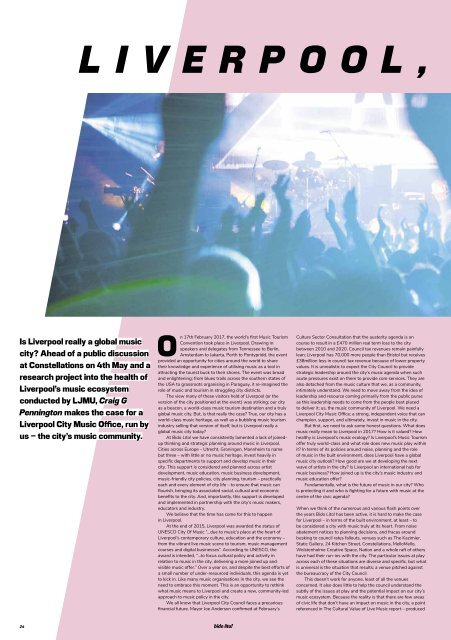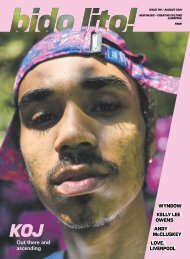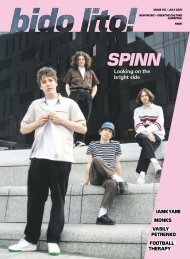Issue 76 / April 2017
April 2017 issue of Bido Lito! magazine. Featuring: ALI HORN, WILD BEASTS, MARY MILLER, TINARIWEN, MIC LOWRY, I SEE RIVERS and much more.
April 2017 issue of Bido Lito! magazine. Featuring: ALI HORN, WILD BEASTS, MARY MILLER, TINARIWEN, MIC LOWRY, I SEE RIVERS and much more.
Create successful ePaper yourself
Turn your PDF publications into a flip-book with our unique Google optimized e-Paper software.
LIVERPOOL,<br />
Is Liverpool really a global music<br />
city? Ahead of a public discussion<br />
at Constellations on 4th May and a<br />
research project into the health of<br />
Liverpool’s music ecosystem<br />
conducted by LJMU, Craig G<br />
Pennington makes the case for a<br />
Liverpool City Music Office, run by<br />
us – the city’s music community.<br />
On 17th February <strong>2017</strong>, the world’s first Music Tourism<br />
Convention took place in Liverpool. Drawing in<br />
speakers and delegates from Tennessee to Berlin,<br />
Amsterdam to Jakarta, Perth to Pontypridd, the event<br />
provided an opportunity for cities around the world to share<br />
their knowledge and experience of utilising music as a tool in<br />
attracting the tourist buck to their shores. The event was broad<br />
and enlightening; from blues trails across the southern states of<br />
the USA to grassroots organising in Paraguay, it re-imagined the<br />
role of music and tourism in struggling city districts.<br />
The view many of these visitors held of Liverpool (or the<br />
version of the city positioned at the event) was striking; our city<br />
as a beacon, a world-class music tourism destination and a truly<br />
global music city. But, is that really the case? True, our city has a<br />
world-class music heritage, as well as a bubbling music tourism<br />
industry selling that version of itself, but is Liverpool really a<br />
global music city today?<br />
At Bido Lito! we have consistently lamented a lack of joinedup<br />
thinking and strategic planning around music in Liverpool.<br />
Cities across Europe – Utrecht, Groningen, Mannheim to name<br />
but three – with little or no music heritage, invest heavily in<br />
specific departments to support and develop music in their<br />
city. This support is considered and planned across artist<br />
development, music education, music business development,<br />
music-friendly city policies, city planning, tourism – practically<br />
each and every element of city life – to ensure that music can<br />
flourish, bringing its associated social, cultural and economic<br />
benefits to the city. And, importantly, this support is developed<br />
and implemented in partnership with the city’s music makers,<br />
educators and industry.<br />
We believe that the time has come for this to happen<br />
in Liverpool.<br />
At the end of 2015, Liverpool was awarded the status of<br />
UNESCO City Of Music “…due to music’s place at the heart of<br />
Liverpool’s contemporary culture, education and the economy –<br />
from the vibrant live music scene to tourism, music management<br />
courses and digital businesses”. According to UNESCO, the<br />
award is intended, “…to focus cultural policy and activity in<br />
relation to music in the city, delivering a more joined up and<br />
visible music offer.” Over a year on, and despite the best efforts of<br />
a small number of under-resourced individuals, this agenda is yet<br />
to kick in. Like many music organisations in the city, we see the<br />
need to embrace this moment. This is an opportunity to rethink<br />
what music means to Liverpool and create a new, community-led<br />
approach to music policy in the city.<br />
We all know that Liverpool City Council faces a precarious<br />
financial future. Mayor Joe Anderson confirmed at February’s<br />
Culture Sector Consultation that the austerity agenda is on<br />
course to result in a £470 million real term loss to the city<br />
between 2010 and 2020. Council tax revenues remain painfully<br />
lean; Liverpool has 70,000 more people than Bristol but receives<br />
£38million less in council tax revenue because of lower property<br />
values. It is unrealistic to expect the City Council to provide<br />
strategic leadership around the city’s music agenda when such<br />
acute pressures exist on them to provide core services. They are<br />
also detached from the music culture that we, as a community,<br />
intimately understand. We need to move away from the idea of<br />
leadership and resource coming primarily from the public purse<br />
as this leadership needs to come from the people best placed<br />
to deliver it; us, the music community of Liverpool. We need a<br />
Liverpool City Music Office; a strong, independent voice that can<br />
champion, support, and ultimately, invest in music in the city.<br />
But first, we need to ask some honest questions. What does<br />
music really mean to Liverpool in <strong>2017</strong>? How is it valued? How<br />
healthy is Liverpool’s music ecology? Is Liverpool’s Music Tourism<br />
offer truly world-class and what role does new music play within<br />
it? In terms of its policies around noise, planning and the role<br />
of music in the built environment, does Liverpool have a global<br />
music city outlook? How good are we at developing the next<br />
wave of artists in the city? Is Liverpool an international hub for<br />
music business? How joined up is the city’s music industry and<br />
music education offer?<br />
Fundamentally, what is the future of music in our city? Who<br />
is protecting it and who is fighting for a future with music at the<br />
centre of the civic agenda?<br />
When we think of the numerous and various flash points over<br />
the years Bido Lito! has been active, it is hard to make the case<br />
for Liverpool – in terms of the built environment, at least – to<br />
be considered a city with music truly at its heart. From noise<br />
abatement notices to planning decisions, and fracas around<br />
busking to council rates fallouts, venues such as The Kazimier,<br />
Static Gallery, 24 Kitchen Street, Constellations, MelloMello,<br />
Wolstenholme Creative Space, Nation and a whole raft of others<br />
have had their run-ins with the city. The particular issues at play<br />
across each of these situations are diverse and specific, but what<br />
is universal is the situation that results; a venue pitched against<br />
the bureaucracy of the City Council.<br />
This doesn’t work for anyone, least of all the venues<br />
concerned. It also does little to help the council understand the<br />
subtly of the issues at play and the potential impact on our city’s<br />
music ecosystem. Because the reality is that there are few areas<br />
of civic life that don’t have an impact on music in the city, a point<br />
referenced in The Cultural Value of Live Music report – produced<br />
24


















